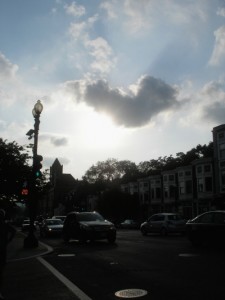
Meandering along a street in Georgetown recently, I looked out at the throngs of people, walking in pairs and groups and singly, ethnicities as varied as their unseen motivations in walking out that day. I saw them, and felt apart; not disconnected or of some different species, an outsider looking in, but in the way of feeling that I was more self-aware at that moment. A single cell in a much larger organism, looking out and seeing the workings of all other cells. It was a knowing that I could see us all, self-organizing sacks of meat composed of so many tiny molecules, marvelously complicated and simple at the same time.
Hierarchies of behavior, heuristics for selecting actions, emotions and motivations influencing them all. Somehow self-aware, conscious of being, conscious of our consciousness. And I, in that moment, more conscious than the rest, looking at the curve of the road, the brick buildings squeezed up beside white-painted shops and little restaurants, the cars and trucks speeding by, and the people, all blissfully ignorant of everything at my level of awareness.
It was a feeling of awe. If I were a religious being, perhaps I would say I felt the hand of a god, touching me then, showing me the vast oneness of the universe. But I am not, and so I interpreted the feeling otherwise: not a part of any great unity, no; merely one agent existing in a world and conscious of that existence. Marveling at that existence -- that any clump of matter could build a society, could conquer the land and sea and air, could walk briskly down a cement sidewalk thinking or not thinking of the weird complexities of the animal brain that made any of these accomplishments possible. That we could organize ourselves such that societies are possible, and so are streets, and restaurants, and cars.
Sometimes it strikes me like that: The realization that all we are, all we ever are, are clumps of molecules bumping around. We have motivations, emotions; we have what feels like intentionality and we speak to each other, creating stories and lies and truths. But we are not special. We have no meaning. The most marvelous thing of all is that we have no more meaning than the simple biologically-inspired, behavior-based robots I created for my thesis. Agents, existing in and interacting with a world. Fascinating, brilliant agents.
Moments like these, wondering at how any of us can exist and marveling at how we do and are conscious of it, I know I picked the right thing to study. That I can be here, writing about the meanings we create and believe, is stupefying and wonderful.




